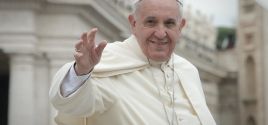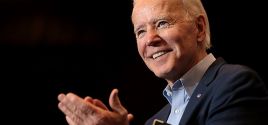Miami Herald publisher resigns; journalists paid for promoting Cuban democracyBy ADRIAN SAINZThe Canadian Press Oct. 03, 2006 |
Popular 
'This is Cruelty, This is Not War': Pope Francis Condemns Gaza Genocide in Christmas Message

Biden Commutes Sentences of 37 of 40 Federal Death Row Inmates - Excludes Robert Bowers, Dylann Roof

Putin Accuses 'Ethnic Jews' of Tearing Russian Orthodox Church Apart

U.S. 'Shoots Down Own Jet' Over Red Sea in 'Friendly Fire Incident'

Saudi National Rams Car Into Germans at Christmas Market in Suspected Terrorist Attack [UPDATED 2X]
 MIAMI - The Miami Herald's publisher resigned Tuesday, saying "ambiguously communicated" personnel policies resulted in the firings of three journalists at its Spanish-language paper who were paid to appear on U.S.-government broadcasts aimed at promoting democracy in Cuba. Jesus Diaz, the papers' publisher since July 2005, had dismissed two El Nuevo Herald reporters and a freelance contributor who had been paid by Radio Marti and TV Marti. Diaz said the company offered to rehire the three and that six others who took payments would not be disciplined. Diaz also resigned as president of the Miami Herald Media Co. "I realize and regret that the events of the past three weeks have created an environment that no longer allows me to lead our newspapers in a manner most beneficial for our newspapers, our readers and our community," Diaz wrote in a letter to readers announcing his resignation. David Landsberg, a longtime Herald employee who served as general manager, took over immediately as company president and publisher of the two newspapers, said The McClatchy Co. (NYSE:MNI), the papers' parent company based in Sacramento, Calif. McClatchy acquired the newspapers in June when it bought Knight Ridder Inc. "While we are sorry to see Jesus leave, we couldn't be happier about having such a talented and experienced leader perfectly poised to step into this important job," said Gary Pruitt, McClatchy president and CEO. McClatchy spokeswoman Elaine Lintecum declined comment beyond what was in the company's news release. Diaz said he believed the journalists' acceptance of payments "was a breach of widely accepted principles of journalistic ethics." But he added "our policies prohibiting such behaviour may have been ambiguously communicated, inconsistently applied and widely misunderstood over many years in the El Nuevo Herald newsroom." He said no one would be allowed in the future to accept money from the U.S. government-run broadcasters, and conflict-of-interest policies would be strengthened. The Miami Herald reported early last month, citing government documents, that 10 South Florida journalists had received thousands of dollars from the federal government for their work on radio and TV programming aimed at undermining Fidel Castro's communist regime. Pablo Alfonso, who reports on Cuba and wrote an opinion column for El Nuevo Herald, was paid almost US$175,000 since 2001 to host shows on Radio and TV Marti, U.S. government programs that promote democracy in Cuba, according to government documents obtained by the Herald. Olga Connor, a freelance reporter who wrote about Cuban culture for El Nuevo Herald, received about US$71,000 from the U.S. Office of Cuba Broadcasting, and staff reporter Wilfredo Cancio Isla, who covered the Cuban exile community and politics, was paid almost US$15,000 in the last five years, the Herald reported. The dismissals caused a furor among members of Miami's Cuban-American community, which responded with cancelled subscriptions and attacks on Diaz and some of the newspaper's editors and journalists in letters and e-mails. Critics also said Diaz reacted too quickly and harshly The Herald's internal probe revealed that four of the six El Nuevo Herald employees who accepted payments from Radio Marti and TV Marti had been approved by El Nuevo Herald executive editor Carlos Castaneda, who died in 2002. Diaz spent the past 14 months as head of the Herald's operations and oversaw the ownership transition from Knight Ridder to McClatchy and through several hurricanes that strained production schedules. He joined the Herald in 1993 as vice-president and chief financial officer before departing three years later. He returned as general manager in 2002 and succeeded Alberto Ibarguen in 2005. Diaz said he planned to seek an opportunity to become CEO of a company. |



